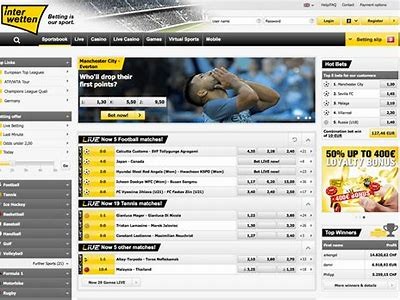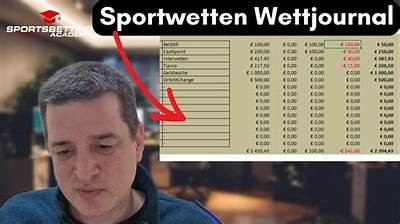As sports betting continues to gain popularity across the globe, understanding the intricacies of various betting platforms is crucial for enthusiasts. One such platform is Interwetten, which not only offers a variety of betting options but also has specific regulations such as the Wettsteuer. This guide aims to shed light on what Wettsteuer is, how it affects bettors, and what players should consider when placing wagers at Interwetten. The term 'Wettsteuer' translates to betting tax in English and is a legal obligation imposed on the profits made from sports betting in certain jurisdictions, particularly in Germany and Austria. This regulation mandates that a certain percentage of a bettor's winnings is paid as tax to the government. Knowing how this tax applies to your bets can greatly influence your overall experience and profitability. The Wettsteuer is typically calculated as a percentage of the net winnings. For example, if a bettor wins €100 from a wager and the Wettsteuer is set at 5%, the amount paid in tax would be €5, leaving the bettor with €95 in their pocket. It is important to note that the Wettsteuer is usually automatically deducted by the betting platform, meaning that bettors do not need to file any paperwork or pay the tax separately. Interwetten, one of the renowned betting platforms in Europe, adheres to the Wettsteuer regulations. For bettors using Interwetten, this means that a standard percentage of their winnings will be automatically taxed. While this could deter some bettors, there are ways to mitigate the impact of Wettsteuer on your overall betting strategy. Understanding the implications of Wettsteuer can help bettors shape their strategies more effectively. High-value bets may yield lower profits due to the tax, so punters should consider factor this into their wagering decisions. For example, some bettors may choose to focus on lower risk bets with higher probabilities of winning rather than chasing high-risk bets that could lead to substantial losses after taxes. Calculating potential winnings with Wettsteuer in place involves a relatively straightforward formula. Start by determining your gross winnings and then calculating the tax amount based on the current Wettsteuer rate. Subtracting the tax amount from the gross winnings gives you your net profit. Bettors should take the time to familiarize themselves with this process to better understand the financial implications of their betting activities.
The standard Wettsteuer in Germany and Austria is generally around 5%. However, this may vary depending on specific regulations in other countries. Understanding these rates is essential for bettors who frequently engage in cross-border betting. It’s advisable for players to consult with the betting platform or local regulations to confirm current rates.
Interwetten has established itself as a reputable platform that prioritizes user experience while complying with local laws, including Wettsteuer requirements. The platform offers a wide range of betting options, competitive odds, and various promotions, which provide added value to players. Bettors should weigh these factors against the impact of Wettsteuer when deciding where to place their bets.
While Wettsteuer is an unavoidable element for bettors in regulated markets, there are strategies to minimize its impact. For example, bettors can consider utilizing promotions and bonuses offered by Interwetten, which can enhance potential winnings and offset some of the tax burden. Additionally, focusing on betting opportunities with lower Wettsteuer applications, such as fixed-odds betting, may yield better results.
As with any form of gambling, responsible betting remains paramount. Understanding how Wettsteuer affects your betting strategy can aid in maintaining a healthy attitude towards wagers and finances. Setting limits and approaching betting as a form of entertainment rather than a means of income can lead to a more enjoyable experience overall.
Navigating the world of sports betting, especially with regulations like Wettsteuer, can be challenging for enthusiasts. However, by educating oneself on the implications and leveraging platforms like Interwetten, bettors can enhance their experience and make informed decisions. Emphasizing strategic betting and responsible gaming will maximize both enjoyment and financial management in this exhilarating world.
As a final note, let's address some frequently asked questions about Wettsteuer and its specific application at Interwetten:
Yes, Wettsteuer applies to all types of sports betting available on the platform, including live betting and pre-match wagers.
The current Wettsteuer rate can typically be found in the terms and conditions section of the Interwetten website or by contacting their customer support.
No, the Wettsteuer is automatically deducted from your winnings, so you will not receive a separate invoice or need to file anything.
Wettsteuer applies only to winning bets. If you do not win, there is no tax obligation on your losses.
Wettsteuer is a specific tax imposed on betting profits, whereas normal taxes on income refer to taxes on overall earnings from various sources.
In conclusion, understanding Wettsteuer is crucial for making informed betting decisions at Interwetten. This knowledge not only aids in better financial planning but also allows bettors to enjoy their experience more thoroughly.
```
Comprehensive Guide to Understanding Wettsteuer at Interwetten for Sports Betting Enthusiasts

What is Wettsteuer?

How Does Wettsteuer Work?

Wettsteuer at Interwetten: An Overview

Impact on Betting Strategy

How to Calculate Your Winnings with Wettsteuer
Tax Rates: What Bettors Need to Know
The Role of Interwetten in the Betting Ecosystem
Mitigating the Effects of Wettsteuer
The Importance of Responsible Betting
Conclusion: Navigating Wettsteuer with Interwetten
FAQs about Wettsteuer at Interwetten
1. Is Wettsteuer applicable on all types of bets?
2. How can I check the current Wettsteuer rate?
3. Will I receive an invoice for my Wettsteuer payments?
4. Can I get a refund on Wettsteuer if I lose my bets?
5. How is Wettsteuer different from normal taxes on income?
